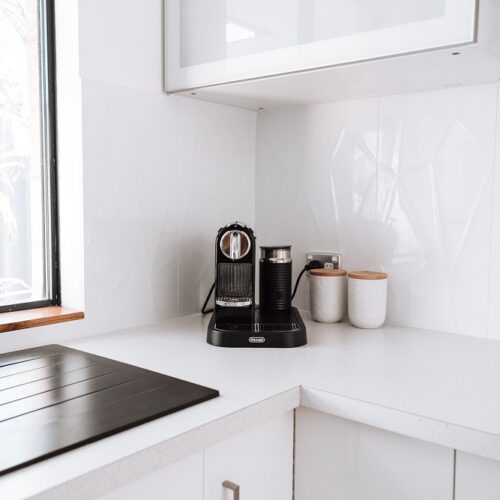
Most refrigerators come with a water filter connected to their ice or water dispenser. If you depend on your refrigerator water filter for clean drinking water, you may be wondering how effective it is. Does it get the job done? Is it safe to use?
If these questions keep you up at night, you’re not alone. Many people like you share these concerns. Some worry that refrigerator filtered water still contains many harmful chemicals, or chlorine.
In this article, we’re going to clear the air. We’ll go over what a refrigerator water filter is, how it works, what it filters, and if it can remove chlorine.
What is a Refrigerator Water Filter?
Water filters remove chemicals and other harmful substances from water. There are different types of water filters. The most popular among them include whole house water filters, under sink water filters, and countertop water filters. Less talked about are refrigerator water filters.
Most modern refrigerators have an inbuilt water filter. The refrigerator water filter cleanses the water supplied to the fridge and provides safe drinking water and ice from its dispenser.
How Does a Refrigerator Water Filter Work?
Refrigerator water filters remove contaminants by pushing the water through a layer of activated carbon contained inside of them. The pollutants remain trapped in the carbon, allowing only clean water to flow out the other end.
Refrigerator water filters need to be replaced regularly. The carbon can only take so much contaminants before it becomes overwhelmed. An old, overused filter will contain too many contaminants, and when water passes through the carbon filter media, some chemicals and heavy metals will slip through. In essence, using old water filters defeats the entire purpose of filtering water.
What Contaminants Can a Refrigerator Water Filter Remove?
Refrigerator water filters are smaller than most filters used, but don’t let that fool you—they’re just as effective. They clear out most toxins and contaminants commonly present in water. If you already use a refrigerator filter, there’s no need to get another one (unless you’d like a whole-house filtering system, which filters water from every outlet in the home).
Some contaminants that can be removed using a refrigerator water filter are:
- Large particles, sand and silt, and other sediments.
- Volatile organic compounds.
- Heavy metals like lead.
- Harmful chemicals.
Can a Refrigerator Water Filter Remove Chlorine?
The short answer is yes. In most cases, refrigerator water filters can effectively remove chlorine and other chemicals from water. They can also remove the bleach-like odor and taste associated with chlorine contamination.
But this depends solely on the type of filter media used. If your refrigerator water filter uses an activated charcoal medium, it’s guaranteed to remove chlorine from water. With other filter media, your refrigerator water filter removing chlorine is not guaranteed. The good news is most refrigerator water filters use activated charcoal media.
Besides chlorine, activated charcoal also removes chlorine-resistant cysts, a kind of microbe that chlorine does not kill.
Factors that Affect Filtration of a Fridge Filter
Fridge filters effectively remove impurities. But sometimes, they don’t work as well as they should. Certain factors can influence and slow down the filtration process.
Using an Inferior Brand of Refrigerator Water Filters
To get the best results from a water filter, you’ll need to pay close attention to design quality. Some filters are better designed than others. If your refrigerator water filter uses an inferior filter mechanism, you can’t expect the best results using it. Before deciding on a refrigerator filter, do your research. Ask questions, and go through a bunch of refrigerator water filter reviews to know the best available options.
Clogged Filter
You already know that most refrigerator water filters use activated charcoal as their filter media.
The pores of these charcoal filters can get clogged with contaminants that settle on them. A clogged filter is slower and less effective. To get the best results, you’ll have to change your filters regularly.
How Often Should You Change the Water Filter in Your Refrigerator?
There are no set rules on when to change your refrigerator water filter, especially when they may be of different brands or types, but anywhere from 3 to 6 months is recommended.
Different Types of Water Filters for Different Refrigerators
Changing your refrigerator water filter is important, but you can’t do that if you can’t locate the filter in your refrigerator.
Here are the different kinds of water filters and where you can find them.
1. In-Grille Filters
These filters blend in with the grille, making them hard to locate. You can find them at the bottom front of the refrigerator and remove them easily with a turn.
2. Canister Filters
Canister filters are easier to find than in-grille filters.
They are shorter with a larger circumference. They’re located in the top food compartment of the fridge.
3. Drop-Down Filters
Drop-down filters are usually stored in a container and can be found in the topmost food compartment.
4. Slide-Out Filters
Like drop-down filters, slide-out filters are located inside the food compartment of the refrigerator. They are called “slide-out” filters because they can be ejected with the push of a button.
How to Choose the Best Refrigerator Water Filter
Entertaining the idea of getting a refrigerator water filter? Hold on a minute. Before choosing one, you must consider some crucial factors. These factors will help you make the best buying decision.
Water Filtration Capacity
A filter’s water filtration capacity is the amount of filtered water produced before it gets clogged or damaged. The standard filtration capacity is about 300 gallons of water.
Design Quality
Quality is everything. Pay attention to customer reviews, both the good and bad.
Cost and Warranty
Only consider refrigerator water filters that are within your budget. As for the warranty, most filters are warranted for lifetime.
Installation
If you have no plumbing experience, get filters that require zero plumbing and fit easily into your refrigerator.
© Copyright 2022 Antonia, All rights Reserved. Written For: Tidylife


Leave a Reply